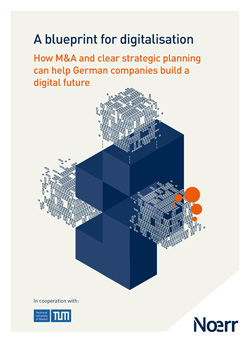Research: M&A can boost digital transformation
Acquisition motivation: access to new business models / clear digitalisation strategy decisive factor for success
A clear digitalisation strategy is a decisive factor in successfully transforming companies’ business models in the digital age. In order to expand their digital capabilities, German companies often rely on acquiring know-how. One-quarter of all M&A transactions in 2017 were digitally motivated. These are some of the significant results of new research by the law firm Noerr and the Technical University of Munich. According to the study, companies that have a clear digital strategy make significantly more progress in digitalisation. Digitally motivated transactions prove valuable if the acquiring firm is able to integrate the target company’s organisational structures, culture and management information systems as well as to retain its key employees.
For the research, 150 decision-makers in German companies were questioned. They provided information on whether and if so, to what extent, their companies were transforming their own business models and what role M&A played in this.
From 2013 to 2017, M&A transactions in the German market with a digitalisation element increased by 6% to 25% (source: Mergermarket). One of the main motivators for the trend is using the transactions to gain access to new business models. Almost one-half (48%) of the persons questioned stated that this reason was “very important” in deciding to execute a transaction.
“The research shows that this motivation comes from a lack of digitalisation know-how in the companies,” says Noerr partner Gerald Reger. Of those surveyed, 68% stated that digital transformation played a pivotal role in their company’s business strategy. But 45% of the companies surveyed had either no clear digital strategy or no digital strategy at all.
Analogue Leadership
In German companies, digital technology is currently used mainly in front-end customer-facing or operational functions – from purchasing through production to distribution. “If a company’s processes are completely digitalised, the internal information that results can also benefit strategic decision making,” says Gerald Reger. But the survey painted a different picture. Significantly fewer companies use digital tools – especially big data and artificial intelligence – to help prepare or support decisions made by the company’s executive leadership or to improve measures to ensure compliance.
“Digitalisation is not yet being used to its full potential in the decision-making processes at companies’ highest levels,” commented Gerald Reger. Although executive management is responsible for digitalisation in most companies, 77% of those questioned felt that digitalisation has yet to make an impact on decision-making in companies’ boards.
“Companies that have an underdeveloped digital strategy or none at all face greater challenges in the digital transformation of their business models,” says Isabell Welpe of TU Munich. According to the survey, companies with a clear digital transformation strategy pursue their digital transformation much more actively. M&A transactions with a digitalisation element are the most popular choice for this. Of those surveyed, 71% responded that acquisitions of digital companies play a major role in their digital transformation. Companies that already had a digital strategy in place made more progress on this front. According to the study, in the past two years, such companies were significantly more likely to be involved in digital M&A activities (survey result: 4.75 on a scale of 1-5) than companies without such a strategy (4.11). Investments in research and development as well as accelerators and incubators are additional essential levers for a company’s digitalisation. Again, companies that actively focussed on digitalisation were significantly more active.
Success factors for digital M&A
The authors of the study also looked at what factors led to fruitful M&A transactions. “It became obvious that the use of digital technology is an essential factor,” says Thomas Thalhofer, co-head of Noerr’s Digital Business practice. Successful transactions were significantly more likely than less successful transactions to have involved the use of digital tools to evaluate companies and optimise portfolios. According to the research, the greatest challenges in digitalisation-driven transactions are data protection and the transfer of know-how and IP rights (e.g. software). Compared to “classic” M&A transactions, these are especially critical factors for success, according to the surveyed decision-makers.
But “soft factors” are also essential. According to those surveyed, digital transactions are particularly successful if the organisational structure, culture and management information systems of the target company are successfully integrated into the acquiring company’s organisation. The success of a digitally driven M&A transaction is also highly dependent on whether the target company’s employees remain on board after the takeover.
The study revealed that in successful transactions an average of only 2% of the target company’s employees left the firm during the integration phase, while less successful transactions saw a higher turnover rate – almost 11%. Interestingly, whether the target company’s founder remained after the takeover was not particularly important. While the less successful transactions saw almost 11% of founders leave the company, in the successful transactions the figure was still 9%. “The most important factor is the ability to convince the employees of the added value of a transaction,” commented Gerald Reger. “The team is more important than the captain.”
|
The study “A blueprint for digitalisation” can be downloaded here. |
Video: Research: M&A can boost digital transformation
Well
informed
Subscribe to our newsletter now to stay up to date on the latest developments.
Subscribe now










